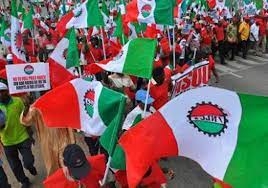Partial Compliance With NLC Strike In Lagos, Abuja, Rivers
The two-day warning strike of the Nigeria Labour Congress (NLC) commenced on Tuesday to partial compliance from workers in some parts of the country, including Lagos State, Rivers State, and Abuja. Some Lagosians expressed their frustration over the hardship occasioned by the removal of fuel subsidies by President Bola Tinubu.
Workers of Ikeja Electric were locked out of their offices as some members of the union manned the gate to turn customers back.
But the industrial action order did not have any effect at the Lagos State Secretariat where workers were seen going about their regular business.
Bank doors were also open for business with customers seen entering and exiting the bank premises.
In Abuja, the block housing the Federal Ministry of Education at the Federal Secretariat was locked for about five minutes and later opened for civil servants to resume work.
Meanwhile, other blocks at the secretariat remained open with workers going into the building for work.
However, the turnout of workers is significantly low compared to other workdays.
The situation was similar at the Rivers State Secretariat as some civil servants were seen at the Secretariat.
Life After Subsidy Removal
President Bola Tinubu announced in his inaugural speech on May 29 that “fuel subsidy is gone,” leading to fuel prices more than tripling nationwide and a rising cost of living.
The NLC declared the warning strike last Friday, saying it was in protest against the Federal Government’s failure to address the challenges caused by the removal of fuel subsidies.
The labour union is accusing the Federal Government of abandoning the negotiations and failing to implement some of the resolutions from previous meetings with the government.
On August 2, organised labour protested what it described as the anti-people policies of the administration of President Bola Tinubu.
The NLC, Trade Union Congress (TUC) and their affiliate unions demonstrated in the Federal Capital Territory (FCT) and several states, including Lagos, Abia, Plateau, Kaduna, Kano, Rivers, Zamfara, Katsina, Cross River, Ebonyi, Enugu, Kwara, Ogun, Imo, Ondo, and Edo.
The protest followed a seven-day ultimatum issued to the Federal Government demanding “the immediate reversal of all anti-poor policies of the federal government including the recent hike in PMS (Premium Motor Spirit) price, increase in public school fees, the release of the eight months withheld salary of university lecturers and workers”.
The union also demanded an upward review of the minimum wage from N30,000 to N200,000, saying that since the President’s “subsidy is gone” inauguration speech of May 29, 2023, the peace of mind of Nigerians has gone.


Tue, Sep 05, 2023.
by Emeka Opara